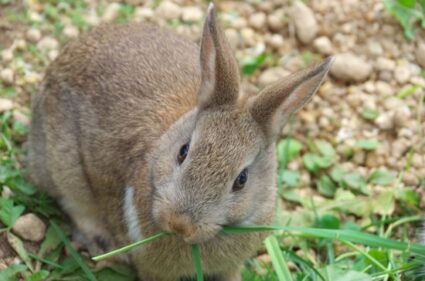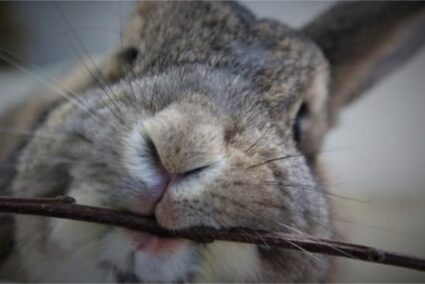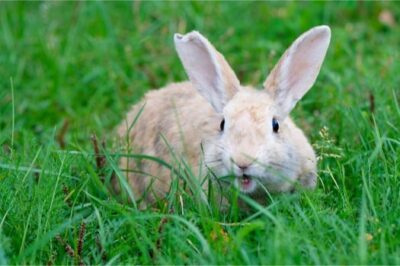Though pet rabbits are cute and cuddly, they sometimes bite. Rabbits can bite people for many reasons, including stress, fear, or mistaking you for food. Though bites from rabbits can be rather painful, they don’t usually cause any health and medical complications.
Bites from pet rabbits hurt and often bleed. However, rabbit bite wounds are usually not deep, and don’t require medical intervention. Occasionally, bites can get infected, in which case you may need antibiotics. You should also get a tetanus shot if you haven’t had one in the last ten years.
We’ll explore the reasons why rabbits bite humans, and how to tell a nip and bite from a rabbit apart. We’ll discuss how harmful rabbit bites are, including whether they can spread diseases. We’ll also provide a five-step guide to treating rabbit bites safely at home.
Why Do Rabbits Bite Humans?
Rabbits are among the sweetest and friendliest domestic animals. Pet rabbits can develop strong bonds with humans, and enjoy grooming and playing with us.
However, every animal can occasionally bite, no matter how strong their bond with their owner. Rabbits are no exception to the rule.
The reasons rabbits bite their owners are as follows:
- Fear. Being chased, picked up, or restrained can cause a rabbit to panic and bite.
- Stress. Noisy, confined or unsatisfactory living conditions can stress a rabbit out. Stressed rabbits are prone to biting.
- Territoriality. Rabbits that have not been spayed or neutered are particularly prone to territorial behavior. They can bite if they feel that you’re invading their space.
- Pain and illness. Rabbits that are in pain can often lash out and bite, especially when touched.
- Mistaking you for food. If your hands smell like food, your rabbit may confuse your fingers with a tasty treat.
If your rabbit bites you deliberately, it’s a sign that you’ve done something they don’t like. You may have accidentally hurt them, annoyed them, or frightened them.
Rabbits also learn to bite through negative reinforcement. For example, your rabbit may bite you because they don’t like being picked up. If you put them down in response, they’ll learn that biting gets them what they want.
Difference Between Nipping and Biting in Rabbits
Real biting is different from nipping. While biting is rare in rabbits, nipping is common.
“Nipping” refers to when rabbits nibble you gently, without opening their mouth wide. Nips feel like small pinches. They do not hurt or break the skin.
Rabbits nip one another to establish the order of dominance. They also nip each other affectionately, usually during a grooming session. They can even nip for attention, or to say “get out of my way.”
A nip from a rabbit is nothing to worry about. Your rabbit is most likely trying to show you love, or asking for something. Some rabbits nip their owners when they’re hungry, for example.
Do Rabbit Bites Hurt?
Rabbit nips are generally painless. They aren’t designed to hurt or wound, merely to communicate with humans. Unfortunately, the same can’t be said for bites.
When a rabbit inflicts a true bite, they open their mouth wide, and clamp down hard. Sometimes, they cling tightly and are reluctant to let go. It’s a signal that the rabbit feels threatened or angry.
Are rabbit bites painful? Yes, but it depends on how sensitive you are to pain. But most would agree that a true rabbit bite hurts.
Rabbits’ teeth are long and sharp, for cutting through fibrous leafy greens. They can cut through the skin just as easily, when the need arises. Rabbit bites usually bleed profusely, and take days to heal.
Baby rabbit bites don’t tend to hurt as much as bites from adult rabbits. This is because their teeth are smaller. The same is true for dwarf rabbits vs. larger breeds.
It also depends on how hard the rabbit chooses to bite. If the rabbit is terrified, they may bite harder than if they are merely startled.
Whatever the case, if your rabbit bites you, you’ll know it.

Are Rabbit Bites Harmful?
So, rabbit bites can be painful. But whether they cause any lasting harm is a different question.
Some animal bites are more dangerous than others. In general, wild animals are more at risk of carrying diseases or playing host to parasites. Therefore, they pose more of a threat than bites from domestic rabbits.
The most harm a rabbit bite is likely to cause is bleeding. This should stop with pressure applied to the wound. There is some risk of further damage from rabbit bites, but it’s much rarer.
Do Rabbit Bites Spread Diseases?
Rabbits can contract a variety of diseases. However, not all conditions can be passed to humans.
Some kinds of bacteria and virus can’t survive in the human body. Myxomatosis, for example, is a common disease that causes disfigurement and death in rabbits. It cannot affect humans, so there’s no danger if you’re bitten by a rabbit with myxomatosis.
So, what diseases can you catch from rabbits? Rabbit diseases that can affect humans include:
- Pasteurellosis. Pasteurella bacteria are found in the mouths and respiratory tracts of many animals, including rabbits. If Pasteurella gets into a rabbit bite, you could develop an infection.
- Tularemia. This is an uncommon but serious disease, caused by bacteria that rabbits can carry. It can be life-threatening, but is treatable with antibiotics.
- Rabies. Though rare in domestic rabbits, rabies can be fatal to rabbits and humans that catch it.
- Tetanus. This is a disease caused when a specific type of bacterial toxin gets into a wound.
Fungal infections and external parasites can also be caught from rabbits. However, they aren’t passed on by bites, but by skin contact.
Catching a disease from a rabbit bite is rare. If you’re concerned, see a doctor for a checkup.
Do Rabbit Bites Cause Infection?
Any wound, no matter the origin, can become infected. Infection is brought on when bacteria finds its way into the wound. There are lots of different types of bacteria, and not all cause infection, but most do.
Rabbit teeth are not sterile, so rabbit bites can become infected if not properly treated. Fortunately, it’s easy to care for a rabbit bite wound and prevent the likelihood of infection.
How to Treat a Rabbit Bite
Almost every rabbit owner will be bitten by their rabbit at some point. No matter how docile your rabbit is, they’re easily startled. Being prey animals, rabbits are prone to panic and may bite if they feel stressed for any reason.
For this reason, it’s important to know what to do if a rabbit bites you. As long as you follow our five steps, you’ll be fine.
Assess the Damage
Some rabbit bites are more severe than others. This depends on how hard your rabbit bit you, and how long and sharp their teeth are.
Most rabbit bites can be treated at home. However, some bites may need to be treated by a medical professional.
After you’ve moved away from your rabbit, assess the damage caused by the bite. Apply pressure with a clean cloth for ten minutes to stem bleeding before inspecting the wound.
You may need stitches if the wound:
- Is deeper than 1 centimeter (0.3 inches)
- Is located on an area of the body that moves, i.e., a joint, or on a sensitive area such as the face
- It continues bleeding after pressure has been applied for ten minutes
If any of the above apply, visit the emergency room. If the cut doesn’t seem too bad, you can treat it yourself.

Clean the Wound
After applying pressure for 10 minutes, your rabbit bite should have stopped bleeding as freely. It may still be trickling blood, but that’s OK. You can stop applying pressure at this stage.
The next step is to wash the wound. This will help to get rid of any bacteria that may be present in the cut. Rabbits’ teeth aren’t exactly clean, and bites from any animals can contain germs which can be dangerous.
Run your wound under cool, clean water. You can use tap water or bottled water, whichever is easiest. Flush the wound out thoroughly, but avoid pulling it open, as it may start bleeding again.
Use an antibacterial soap to wash the rabbit bite. This may sting slightly, but it’s a necessary step. If dirt gets into a cut, it can become infected, which will require antibiotic treatment.
Apply Antibiotic Ointment
After you’ve washed your cut, pat it dry with a clean, lint-free cloth. Avoid rubbing it to prevent the wound from opening up again.
Once your wound is dry, you can apply antibiotic ointment, such as Neosporin. This helps to further reduce the chances of infection by stopping the growth of bacteria.
Think of it as an insurance policy, just in case any germs remained in the rabbit bite after washing. It also acts as a shield, preventing any outside bacteria from getting in.
The ointment also helps to keep the wound moist, to promote healing. Some creams also contain pain-relief medication, which is optional.
Apply a thin layer and rub it in gently, taking care not to disrupt the wound.
Dress the Wound
If your wound isn’t severe, and has stopped bleeding, you can leave it to heal uncovered. However, applying a dressing or bandage is preferable. This keeps the cut and the surrounding skin moist.
According to the Journal of the European Academy of Dermatology and Venereology, keeping a wound moist helps to:
- Regenerate tissue (heal) faster
- Protect against infection
- Reduce the chance of scarring
Also, keeping your rabbit bite covered with dressing will also help protect it. There’s less chance of it opening up and beginning to bleed again. If it does bleed, the dressing will soak up the blood.
Use a dressing which is bigger than the wound, to ensure it’s properly covered. You can use an adhesive bandage (Band-Aid), or a sterile dressing pad affixed with surgical tape.
Check for Signs of Infection
As the wound heals, change your bandage once per day. Use this opportunity to check how the wound is healing, and look out for signs of infection.
If any blood has soaked through your bandage, the dressing may become stuck to the skin. If this is the case, soak it in water to loosen it before removing.
Once you’ve removed the dressing, wash the wound gently with soap and water. Pat dry, and then examine the cut.
Each day, the rabbit bite should have healed a little more. If not, the wound may be infected. Watch out for:
- Redness or hot skin surrounding the wound
- Swelling
- A bad odor emanating from the wound
- Pain that lasts for longer than a day
- Pus (clear, thin fluid is normal on the first day, but opaque pus is not)
- Numbness or loss of movement in the wound area
As the infection progresses, you may notice more severe symptoms such as fever, malaise, nausea, and fatigue.
If you suspect you have an infection, or have caught a disease from your rabbit, visit a doctor immediately.
Do I Need a Rabbit Bite Vaccine?
Usually, the above treatment will be sufficient to prevent complications from rabbit bites. However, you may be wondering: if I’ve been bitten by a rabbit do I need a tetanus shot?
Tetanus is a disease caused by bacteria getting into a wound. Though it’s usually contracted from soil or manure, animal bites can cause tetanus too.
Only about 30 people are diagnosed with tetanus each year in the United States. Your risk is significantly higher if you aren’t up-to-date with your tetanus shots.
Vaccines for tetanus only last ten years. So, if it’s been longer than ten years since your last one, consider getting another. As long as you receive the shot within 48 hours of the rabbit bite, it will protect you.
Other than tetanus, the only thing to consider is rabies. Rabies is a severe viral disease spread exclusively by animal saliva. It’s rare in pet rabbits, especially if your rabbit has been vaccinated for it.
However, if you suspect that your rabbit has rabies, or if you were bitten by a wild rabbit, see a doctor immediately. Rabies is often fatal, but can be prevented if treated quickly.

